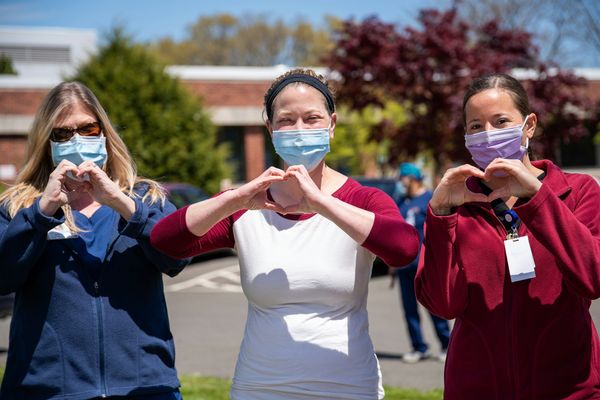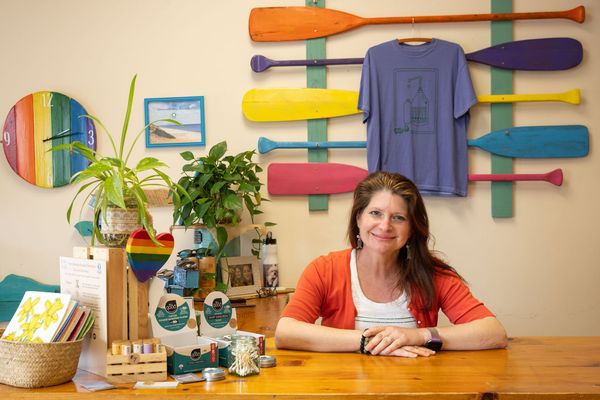climate solutions
Who funds conservative climate groups
A surprising coalition of philanthropists, including liberal donors, is supporting conservative climate change initiatives to foster bipartisan solutions.
In short:
- Philanthropic donors like the Gates' Breakthrough Energy Foundation and the MacArthur Foundation are funding both liberal and conservative climate groups.
- Conservative groups such as Citizens for Responsible Energy Solutions and the American Conservation Coalition are receiving millions to promote market-based and innovation-driven climate solutions.
- Funders aim to engage Republicans in the climate fight, believing a bipartisan approach is essential for long-lasting climate policies.
Key quote:
“We have been adamant about trying to be nonpartisan but recognizing we do need to be thinking about other political constituencies, other communities and really as broad as we can when we think about equity.”
— Mijo Vodopic, head of the climate program at the MacArthur Foundation
Why this matters:
This funding strategy seeks to unite diverse political perspectives, ensuring comprehensive climate action that can withstand political changes, thereby improving health outcomes and environmental sustainability. Read more: Flood survivors find common ground in a divided nation.
Op-ed: In a warming world, nurses heal people and the planet
Nurses have the experience, motivation and public support to make an important contribution in tackling the climate crises.
During the Covid pandemic, the world cheered as we nurses stepped up. Everyone knows we are essential workers, but our essential role in coping with the climate crisis is much less cheered on, despite our ongoing efforts to be part of the solution.
According to The Lancet, climate change is the greatest global health threat of the 21st century. As temperatures soar, so do cases of heat-related illness and death, cardiac and respiratory disease, and infections like dengue and valley fever. There are 29 million of us nurses worldwide, with deep ties to the communities we serve. We are right there on the front lines – in clinics and hospitals, nursing homes and schools, seeing the health impacts of climate change firsthand.
Because of this, we have earned the public’s respect: in the U.S., we have been voted the most trusted health-care professionals for 22 years running. In a world awash with misinformation about health and climate change, nurses are well-positioned to provide reliable, evidence-based information on both.
Many are rising to that challenge. In Detroit, for example, Mia McPherson, RN worked with the East Side Community Network to create a guidebook on extreme heat. The guidebook translates medical jargon into plain language, educating the community members about the deadliest climate impact. Others are at the forefront of research and clinical practice on climate health impacts. Roxana Chicas, Ph.D., RN, used real-time biomonitoring equipment to conduct a groundbreaking study of heat-related illness among farmworkers in Florida. Now Chicas is working to develop evidence-based methods to protect workers from dangerous increases in core-body temperature.
We’re also organizing. My organization, the Alliance of Nurses for Healthy Environments (ANHE), has supported and organized nurses advocating for action to protect health against climate threats, like pushing for strong federal regulations that protect outdoor workers from extreme heat, reduce emissions from the power sector and move the United States toward a zero emission transportation sector. Others, like the American Nurses Association, have released powerful statements on climate change.
Other nurses are working to make health care itself more climate-friendly, as the sector’s greenhouse gas emissions make up 8.5% of U.S. carbon emissions. Globally, if healthcare were its own country, it would be the fifth-largest emitter on the planet. Nurses like Sara Wohlford, RN, MPH, are leading sustainability programs within their health systems. When Wohlford began working as an emergency-room nurse at Carilion Roanoke Memorial Hospital, in Roanoke, Virginia, she was shocked by the routine waste of resources. So Wohlford launched a sustainability effort that has cut the hospital’s medical supply and food waste by tens of thousands of pounds per year.
"In a world awash with misinformation about health and climate change, nurses are well-positioned to provide reliable, evidence-based information on both."
Despite these promising initiatives, the power of nurses remains largely untapped.
By supporting efforts to integrate climate change into nursing education, like the Nurses Climate Challenge School of Nursing Commitment or the ANHE’s Fellowship program, which provides nurses with the knowledge and skills needed to successfully collaborate with communities most impacted by climate change, funders can help nurses leverage their power. Other programs, like the Florence Nightingale Foundation’s (FNF) Green Healthcare Leadership Programme, help nurses carve out time to participate in sustainability initiatives within their healthcare institutions.
Finally, funders can foster coordination among international nursing organizations, and support nurses’ attendance at international climate change meetings. These meetings provide unique opportunities for nurses to forge new relationships with governmental agencies and advocacy organizations who are unaware of the reach of nurses on this issue. It is especially important to include nurses from the global south, who are confronting the most extreme health impacts from climate change.
Last year was by far the hottest since humans have been keeping records. As we enter what UN Secretary General Antonio Guterres calls “the era of global boiling,” addressing the climate crisis and its parallel health crisis could not be more urgent. It’s an all-hands-on-deck moment, and nurses have the experience, motivation, and public support to make an important contribution. With more philanthropic support, nurses can help meet this critical moment.
The Biden administration bets big on nuclear power despite past failures
The Biden administration is determined to revive nuclear energy to meet climate goals, despite the industry's history of cost overruns and delays.
In short:
- Energy Secretary Jennifer Granholm emphasized the need to triple nuclear energy output by 2050 to meet climate targets.
- The Vogtle plant in Georgia, despite its extensive delays and cost overruns, is now the largest source of zero-emissions energy in the U.S.
- The administration is also pushing for small modular reactors and reactivating decommissioned plants to boost nuclear energy.
Key quote:
“Whether it happens through small modular reactors, or AP1000s, or maybe another design out there worthy of consideration, we want to see nuclear built.”
— Jennifer Granholm, U.S. Energy Secretary
Why this matters:
With increasing power demands and climate change pressures, the U.S. needs reliable, zero-emissions energy sources. Reviving nuclear power could provide an important boost for achieving sustainable energy independence. Read more: Past deadline and over budget, nuclear energy is struggling.
Colorado shifts focus from highways to transit
Colorado is prioritizing transit over highway expansion to combat climate change and reduce greenhouse gas emissions, a move that also has environmental justice implications.
In short:
- Colorado canceled plans to widen Interstate 25 and redirected $100 million to transit projects.
- The state’s Transportation Commission adopted a rule requiring new projects to reduce greenhouse gas emissions or risk losing funding.
- Other states, like Minnesota, Maryland and New York, are considering similar legislation to follow Colorado's lead.
Key quote:
“We really regard the Colorado rule as the gold standard for how states should address transportation climate strategy.”
— Ben Holland, manager at RMI, a national sustainability nonprofit
Why this matters:
Reducing highway expansion in favor of transit investments is important in lowering transportation emissions, which are a major contributor to climate change and have disproportionately impacted communities of color. This shift not only aims to improve air quality but also sets a precedent for other states to follow in addressing climate challenges. Read more: Black communities must lead the charge to repair harm from freeways.
Biden's hydrogen plan hits transport obstacles
President Biden's $7 billion clean hydrogen initiative faces significant challenges due to unclear regulations on transporting hydrogen fuel, potentially stalling the administration's emission reduction goals.
In short:
- Transporting hydrogen efficiently requires a mix of trucks, existing natural gas pipelines, and new infrastructure, but regulatory gaps and safety concerns pose hurdles.
- There is no federal authority to permit interstate hydrogen pipelines, and many states lack specific regulations for intrastate transport.
- Industry experts emphasize the need for urgent infrastructure planning to meet the administration's hydrogen production targets.
Key quote:
" ... we need to figure out where we’re going to end up using hydrogen because that’ll have a huge impact on to what degree we want to rely on building pipes.”
— Dan Esposito, senior hydrogen policy analyst for climate research firm Energy Innovation
Why this matters:
Hydrogen, often touted as a cornerstone of a future clean energy economy, offers a promising alternative to fossil fuels, especially for sectors like heavy industry and transportation. However, the infrastructure needed to safely and efficiently transport hydrogen is still in its infancy. Without clear and consistent regulations, the development of necessary pipelines, storage facilities, and transportation networks remains sluggish.
Be sure to read: Hydrogen industry growth lags behind U.S. climate targets
Biden's climate push intensifies as elections near
Amid a high-stakes election season, the Biden administration is channeling billions into climate initiatives aimed at securing lasting reductions in greenhouse gas emissions, regardless of future political shifts.
In short:
- The Biden administration is allocating billions to tackle complex climate challenges, funding innovations from zero-emissions concrete to cleaner food production.
- Recent legislation enables significant investment in clean energy projects aimed at reducing emissions, particularly in low-income areas.
- Experts highlight the importance of these investments in influencing global climate action and ensuring sustainability beyond current political cycles.
Key quote:
"We are seeing billions of dollars going into really tricky parts of the energy transition and if there’s momentum behind this we will be measuring the impacts many years in the future."
— Melissa Lott, professor at Columbia University's climate school
Why this matters:
Climate change remains a critical issue among Democratic voters; strong action could galvanize the base, proving President Biden’s commitment to one of his key campaign promises. With extreme weather events becoming more frequent and severe, there is a growing public urgency for action that transcends political lines, potentially helping Biden appeal to moderate and undecided voters.
Zero- and low-waste businesses band together against plastic pollution
As part of a national coalition, sustainable businesses are pooling resources to fight plastic pollution.
Jessica Georges loves the beaches of Cape Cod, Massachusetts, where she lives.
But a few years ago, she realized even the most pristine parts of town weren’t immune to plastic pollution. “You can’t walk three yards on most beach days and not run into some sort of plastic,” she told EHN. Increasingly bothered by what she saw, she created a low-waste business — Green Road Refill — to sell low-cost and low-waste goods to her community.
Now, she and other low-waste businesses are strengthening their efforts to reduce plastic pollution via the National Business Coalition for the Oceans, a nationwide organization of businesses supported by nonprofit Oceana. The coalition focuses on advancing federal, state and local policies to improve ocean health, in part by curbing single-use plastics. Businesses involved in the coalition work for plastics policy change by sending letters, signing petitions, testifying at hearings and educating customers.
“We’re really happy to be part of a coalition where others are bringing their perspectives and their solutions, and we can all join forces and create the systems change that’s necessary,” Lauren Sweeney, a coalition member and co-founder of reusable packaging company Deliver Zero, told EHN.
Plastic policy progress
Oceana’s business coalition emerged in 2021, after a partnership between Oceana, government officials and regional businesses helped ban oil and gas drilling along the Atlantic and eastern Gulf coasts. It became clear businesses voicing their concerns had the power to convince lawmakers, said Claudia Davis, the coordinator of the coalition.
The coalition provides tools to business owners to help them learn about policy issues related to the oceans and gives them accessible ways to participate in policy efforts. Davis organizes members to sign petitions, author opinion pieces to publish in news outlets, testify at hearings and meet with lawmakers about relevant legislation. Any business interested in ocean health can join. Now, 250 business owners, from diving shops to restaurants to refilleries (shops where customers can refill reusable packaging with home and personal care products), are involved.
“We really want to encourage collective action from the business community, because that's what's going to deliver policy victories that make a change for the most people,” Davis told EHN.
At the federal level, the coalition is working to pass the Break Free From Plastic Pollution Act, which would set nationwide plastics reduction targets, ban certain single-use plastic products and create a nationwide beverage container refund program.
The coalition is working to expand the number of states and local governments with similar plastic legislation.
In 2022, the coalition worked with multiple businesses in New York City to pass the “skip the stuff” law, which prohibits New York City restaurants from providing single-use plastics in takeout orders unless the customer asks. While the law will help reduce plastic pollution, it will also help restaurants save money, Davis said.
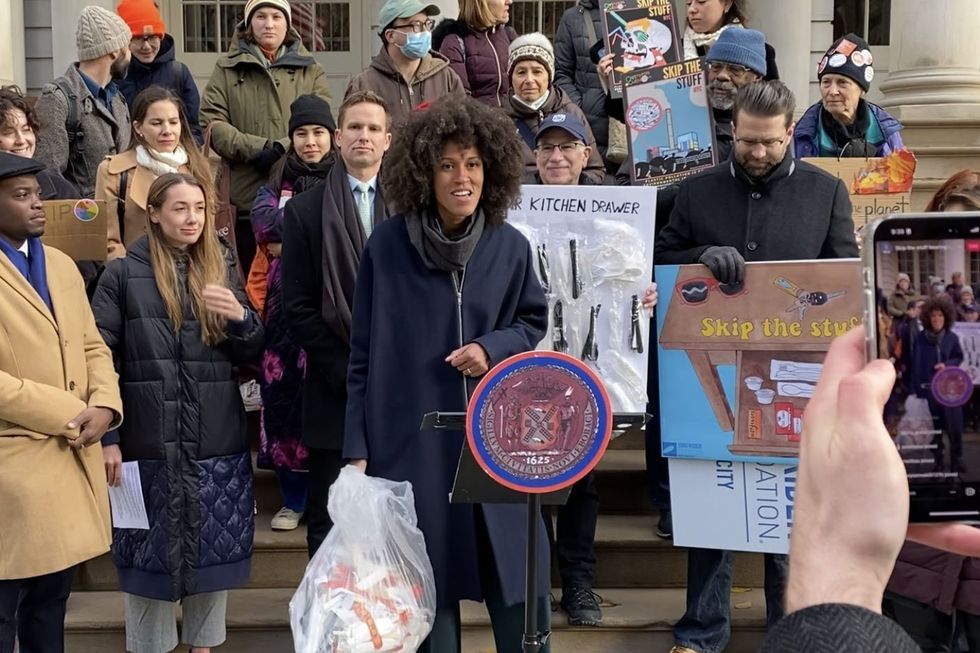
Skip the Stuff rally in NYC.
Credit: Raine Manley/NRDC
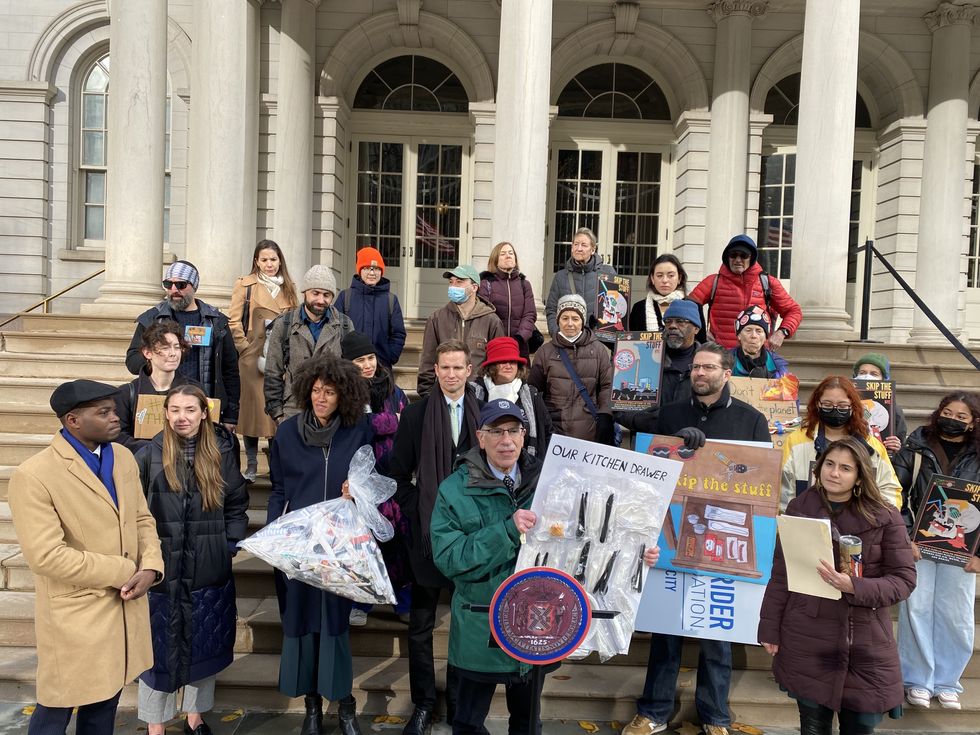
New York City's “skip the stuff” law prohibits New York City restaurants from providing single-use plastics in takeout orders unless the customer asks.
Credit: Raine Manley/NRDC
Sweeney and Larasati Vitoux, another coalition member who runs a New York City refillery called the Maison Jar, testified for the bill at a hearing in front of New York City’s Committee on Consumer and Worker Protection.
“I think it really made a difference to have members of the community who were saying “This is important to me not just as an individual, not just because I want to see less trash in my community, but [because] it's gonna save me and all of us money in the long run,”’ Davis said.
A business perspective
Low-waste businesses can provide a crucial perspective to lawmakers concerned about how policy changes will impact the economy. “Other businesses will come forward and say these bills are terrible for business,” Sweeney said. “Actually, you can run a business without polluting the planet and the oceans. The goal of these organizations is to counter the narrative that plastic reduction solutions are inherently anti-business.”
Bringing business voices to environmental advocacy work is critical, said Jennifer Congdon, deputy director for Beyond Plastics, an environmental nonprofit not involved in Oceana’s coalition. Policymakers can get a lot of reassurance from hearing that environmental policies pushed by advocates “are going to shift the economy, but they’re not going to harm the economy,” she told EHN. “There’s a path forward for economic growth.”
"You can run a business without polluting the planet and the oceans. The goal of these organizations is to counter the narrative that plastic reduction solutions are inherently anti-business.” - Lauren Sweeney, Deliver Zero
At Green Road Refill, Georges sells more than 40 plant-based products such as dish soaps, shampoos and detergents. Running a refill shop is difficult work with slim margins, said Georges and Katie Rodgers-Hubbard, who runs a similar refillery in Savannah, Georgia, called Lite Foot Company.
Bills that restrict single-use plastics give businesses like theirs a leg up by shifting the external costs of plastic like its environmental and public health harms — back to the businesses. “That makes plastic less competitive against other materials and other methods of delivering goods to people,” said Congdon.
Preventing plastic pollution
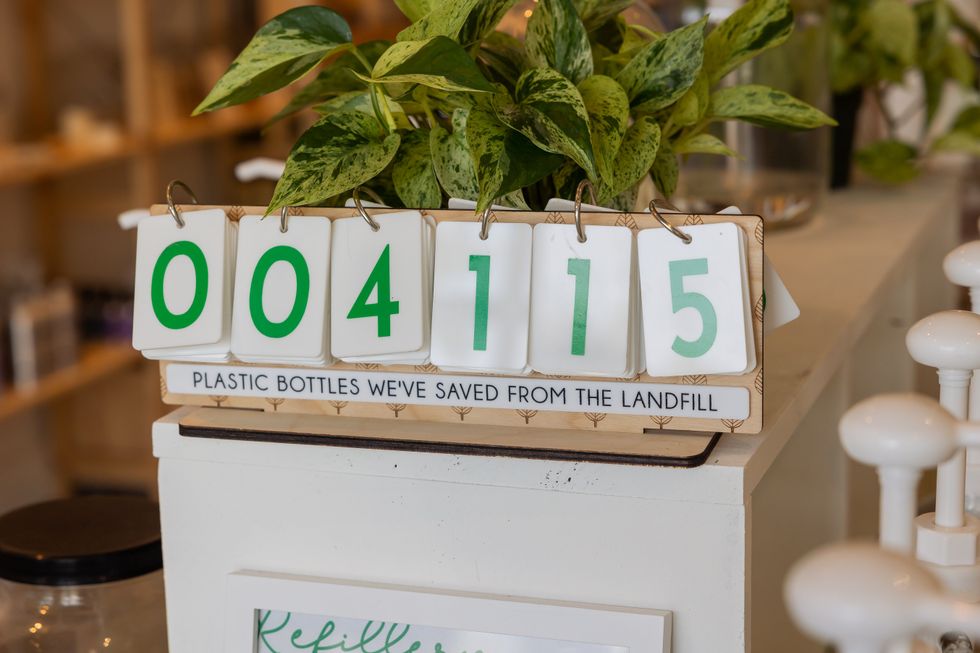
Lite Foot Company in Savannah, Georgia.
Credit: Katie Rodgers-Hubbard/Lite Foot Company
While they work toward policy action, the businesses themselves are helping to fight pollution, too. In 2023, Rodgers-Hubbard decided that running a low-waste business and joining other nonprofit efforts wasn’t enough. She started a new, nonprofit branch of her business: Lite Foot Environmental Foundation.
The foundation is creating a grade-school curriculum to educate students about plastic pollution and reuse. They also host clothing and book swaps and clothing repair days to encourage the Savannah community to extend the life of belongings. “We’re hoping to push the narrative,” Rodgers-Hubbard said. “Let’s fix things, let’s buy things of quality.”
And at Green Road Refill, Georges doesn’t only sell closed-loop products —her suppliers are closed-loop, too. She buys many of her products in 30- to 55-gallon containers from a company called Rustic Strength, which she then sends back to the company once the containers are empty. When considering what to put on her shelves, she prioritizes products with biodegradable and non-toxic ingredients.
Georges also focuses on educating customers and gives talks to libraries and elementary schools about plastic pollution. She asks everyone who gets a refill at her shop to contribute to an art installation made of non-recyclable bottle caps—a great way to start conversations about reducing one’s plastic footprint, she said. She passes information and petitions from Oceana on to customers in her monthly newsletters.
“When I first started, I had to really do a lot of work explaining what plastic was and why it's important to reduce your own plastic footprint,” she said. But now, the people who visit her shop are more familiar with refilleries and living a low-waste lifestyle.
“Businesses that exist almost for the sole purpose of reducing single use plastic are growing,” said Sweeney. “This is an exciting sector and the U.S. could develop more leadership in this sector by actually passing policy more quickly.”





